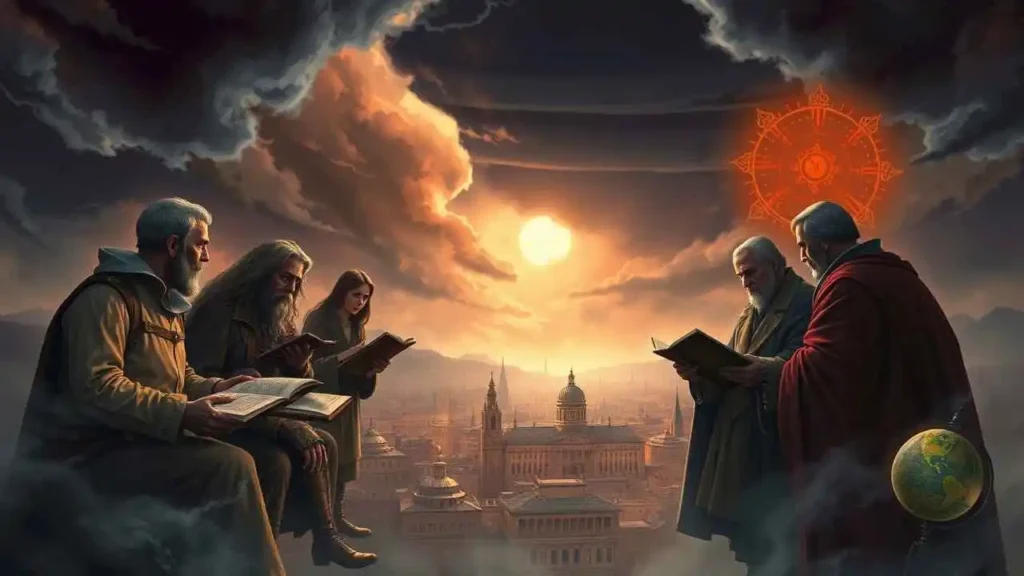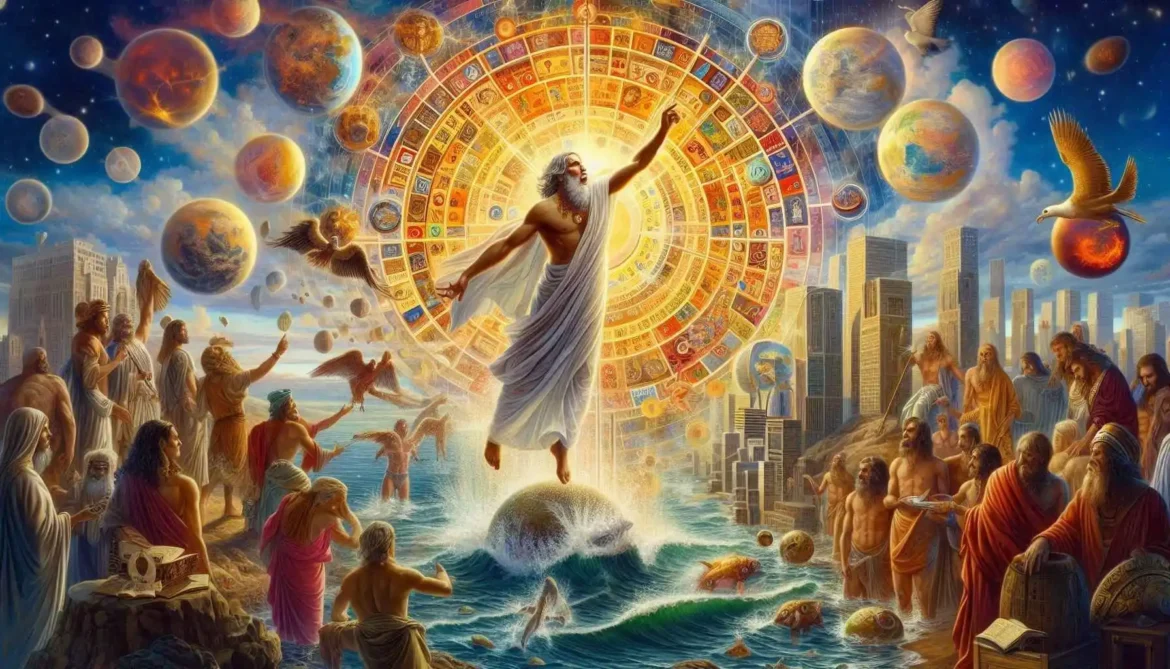
Navigating the Current Storm: Are New Political Realities and Ancient Prophecies Intersecting?
As we look out at the complex tapestry of the modern world, many of us find ourselves seeking patterns, explanations, and perhaps even glimpses of the future. In times of significant global shifts, economic uncertainty, and evolving political landscapes, it is natural for us to ponder whether these events hold deeper meaning, particularly within the framework of our faith traditions. A recurring question for many is whether the strictness of some world leaders, the potential emergence of a “new pope” or significant figure within the Catholic Church (and the role such figures might play), and the dramatic narratives found in biblical prophecy, specifically in the books of Ezekiel and Revelation, are somehow converging.
We embark on this exploration not to make definitive pronouncements about the future, nor to endorse specific eschatological timelines. Rather, our aim is to examine the elements presented – contemporary geopolitical and religious trends alongside ancient prophetic texts – from an informational viewpoint, considering how various interpretations might connect them.
The Prophetic Landscape: Glimpses from Ezekiel and Revelation
Before we delve into contemporary events, it is essential for us to revisit the biblical texts that form the basis of many end-times discussions. Ezekiel, particularly in chapters 38 and 39, paints a vivid picture of a future invasion of the land of Israel by a coalition of nations led by a figure named “Gog from the land of Magog.” This prophecy is often interpreted as a large-scale, climactic battle occurring in the end times, involving nations from specific geographic regions relative to ancient Israel. Themes within this prophecy include the return of the Jewish people to their land (a key pre-condition mentioned in Ezekiel 38:8, 12), a time of relative peace preceding the invasion, and God’s ultimate intervention to display His power to the world.
The Book of Revelation, on the other hand, provides a broader, highly symbolic panorama of the end times, culminating in Christ’s return and the establishment of a new heaven and new earth. Revelation describes a period of intense tribulation, marked by natural disasters (the seals, trumpets, and bowls), global political and economic control (the Beast and its mark in chapter 13), religious deception (the False Prophet in chapter 13), and spiritual warfare. Key figures emerge, including the “Beast from the sea” (often interpreted as a powerful political entity or leader) and the “Beast from the earth” or “False Prophet” (often seen as a religious figure who supports the political beast and causes people to worship it). The level of detail and symbolism in Revelation has led to a vast array of interpretations throughout history – futurist, preterist, historicist, and idealist perspectives all offer different ways of understanding the timeline, the symbols, and their fulfillment.
For us to consider potential connections, it’s crucial to recognize that both Ezekiel and Revelation utilize powerful symbols and narratives that are open to varying degrees of literal and figurative interpretation.
Contemporary Observations: The Rise of Strict Governance
We are currently living through a period characterized by significant shifts in global governance. While democracy remains a predominant form of government in many nations, we also observe a trend towards increasing authoritarianism or stricter forms of control in various parts of the world. This manifests in several ways:
- Consolidation of Power: Leaders in some nations have consolidated power, limiting checks and balances and extending their terms or influence indefinitely.
- Increased State Surveillance: Technological advancements have enabled governments to implement extensive surveillance measures, monitoring citizens’ communications and activities.
- Suppression of Dissent: Civil liberties, including freedom of speech, assembly, and the press, are being curtailed in numerous countries.
- Economic Control: Governments are exerting greater control over economies, sometimes leading to restrictions on trade, capital flow, or individual financial autonomy.
- Emphasis on National Sovereignty: A strong wave of nationalism in many regions prioritizes national interests, sometimes leading to strained international relations and a questioning of global cooperation bodies.
While geopolitical and economic factors undoubtedly drive these trends – such as responses to security threats, managing complex economies, or reacting to perceived external pressures – some analyzing current events through a prophetic lens see potential parallels. They might suggest that the rise of stricter, more centralized forms of governance could be setting the stage for, or are indicative of, the kind of global or regional control scenarios described in prophecies like Revelation 13, which speaks of a political power requiring universal allegiance and control over economic activity (the “mark”).
Let’s consider some characteristics often associated with this trend:
- Centralized decision-making with limited opposition.
- Use of technology for monitoring and control.
- Emphasis on state loyalty over individual freedoms.
- Increased regulation of information and media.
- Growing interdependence of political and economic power.
These observations, while rooted in contemporary political analysis, resonate with themes of centralized power and control found within certain prophetic narratives.
The Papacy: A Role in Prophecy According to Some Interpretations
The role of the Papacy in prophetic interpretations, particularly within Protestant eschatology, has a long and complex history. While mainstream Catholic teaching does not interpret biblical prophecy, including Revelation, as pointing to the Papacy itself in a negative light, some historical Protestant interpretations, and certain contemporary viewpoints, have seen connections between the office of the Pope and prophetic figures, most notably the “False Prophet” described in Revelation 13.
We must understand that this is not a universally accepted view, even among non-Catholic Christians. However, for those who hold this view, the reasoning often involves:
- Historical Association with Rome: Revelation speaks of a powerful city built on seven hills (Rev 17:9), historically associated with Rome.
- Religious Authority and Influence: The Pope is the head of a vast global religious organization, wielding significant moral and, in some interpretations, political influence. The False Prophet in Revelation is described as performing signs and wonders and directing worship towards the political beast.
- The Title “New Pope” or “Current Pope”: For those who hold these interpretations, the specific individual occupying the office is less important than the role and influence of the office itself within the global religious and political landscape, particularly as end-time events are perceived to unfold. They might look for actions or statements by the current Pope or future Popes that seem to align with the description of a religious figure promoting global unity, interfaith dialogue, or even a specific worldview that they believe facilitates or supports the agenda of a global political power (the Beast).
It is vital for us to reiterate that this interpretation is controversial and rejected by many, including the Catholic Church itself. Furthermore, identifying any current religious leader as a specific prophetic figure requires a highly particular and often speculative reading of scripture. Our purpose here is simply to acknowledge that discussions around the Pope’s role exist within some interpretations of prophecy when examining contemporary events.
Connecting the Threads: Are Prophecies Fulfilling?
Now we arrive at the central question: are these contemporary geopolitical and religious trends fulfilling biblical prophecies from Ezekiel and Revelation? Based on the interpretive frameworks discussed, here’s how the connections are sometimes drawn, and why caution is warranted:
| Prophetic Theme (Ezekiel/Revelation) | Biblical Reference (Examples) | Potential Contemporary Parallel (Interpretations) | Caveats and Alternative Views |
| Wars and Rumors of Wars | Matt 24:6, Rev 6:4 | Ongoing regional conflicts, global proxy wars, geopolitical tensions. | History is full of wars; these are not unique to our era. |
| Famine, Pestilence, Disasters | Matt 24:7, Rev 6:5-8, Rev 8, 16 | Global pandemics (COVID-19), supply chain disruptions, climate-related disasters. | Diseases and natural disasters have always afflicted humanity. |
| Return of Israel to the Land | Ezek 37, 38:8 | The establishment and continued existence of the modern state of Israel. | Interpretations vary on whether this is the prophetic fulfillment or a partial step. |
| Rise of Gog/Magog & Allies | Ezek 38, 39 | Identification of specific modern nations (e.g., Russia, Iran, Turkey) with ancient names. | Highly debated identifications; ancient names may not map directly to modern states. |
| Global Political Authority (Beast) | Rev 13 | Discussions of global governance, rise of international bodies, powerful alliances, authoritarian trends. | Global cooperation has also increased; “global government” is not a present reality in the way envisioned. |
| Global Economic Control (Mark) | Rev 13:16-18 | Digital currencies, biometric identification, control over transactions, supply chain vulnerabilities. | Technological trends serve multiple purposes; correlation is not necessarily causation with prophetic fulfillment. |
| Religious Authority/Deception (False Prophet) | Rev 13:11-15, Rev 17 | Influence of major religious leaders (including the Pope in some views), interfaith movements, rise of cults/false teachings. | Religious leaders have always wielded influence; discerning “false teaching” is complex. |
Those who see current events aligning with prophecy often point to the confluence of these factors occurring simultaneously on a global scale: widespread conflict potential, economic fragility, technological capabilities for control, and significant religious/spiritual movements. They might argue that the strictness of world leaders could be a necessary preparatory step for a future global authority, and that a prominent religious figure could provide the necessary spiritual justification or direction for such a system.
However, we must also consider the counterpoints and the inherent challenges in applying ancient prophecy directly to modern events:





